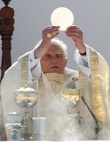Ave verum corpus: Difference between revisions
No edit summary |
|||
| Line 3: | Line 3: | ||
A short Eucharistic hymn dating from the 14th century and attributed to [[wikipedia:Pope Innocent VI|Pope Innocent VI]] (d 1362). During the Middle Ages it was sung at the elevation of the Host during the consecration. It was also used frequently during Benediction of the Blessed Sacrament. The text below is one of the four variants of the hymn that have come down to us. | A short Eucharistic hymn dating from the 14th century and attributed to [[wikipedia:Pope Innocent VI|Pope Innocent VI]] (d 1362). During the Middle Ages it was sung at the elevation of the Host during the consecration. It was also used frequently during Benediction of the Blessed Sacrament. The text below is one of the four variants of the hymn that have come down to us. | ||
==Settings by composers == | |||
<table width=100%> | |||
<tr><td valign="top" width=33%> | |||
*[[Ave verum (Luigi Bordèse)|Luigi Bordèse]], SA, piano or organ | |||
*[[Ave verum corpus (Dominico Brunetti)|Dominico Brunetti]], SSAATTB or SAATTBB, ''a cappella'' | |||
*[[Ave verum corpus (William Byrd)|William Byrd]], ATBB or SATB, ''a cappella'' | |||
*[[Ave verum (Jean de Castro)|Jean de Castro]], ST, ''a cappella'' | |||
*[[Ave verum corpus (Antonio Cosimetti)|Antonio Cosimetti]], SSAATTBB | |||
*[[Ave verum corpus (Christoph Dalitz)|Christoph Dalitz]], SSA, TTB, or SATB, organ | |||
*[[Ave verum corpus (Johan De Wael)|Johan De Wael]], SATB, ''a cappella'' or organ | |||
*[[Ave Verum, Op. 1, No. 2 (Edward Elgar)|Edward Elgar]], SATB with soprano solo, organ | |||
*[[Ave verum corpus, Op. 65, No. 1 (Gabriel Fauré)|Gabriel Fauré]], SA or TB, organ | |||
*[[Ave verum corpus II (2011) (Mariano Garau)|Mariano Garau]], SATB, ''a cappella'' | |||
*[[Ave verum corpus (Charles H. Giffen)|Charles H. Giffen]], SSATBB, ''a cappella'' | |||
*[[Ave verum (Charles Gounod)|Charles Gounod]], SATB, organ ''ad lib.'' | |||
*[[Ave verum corpus (Gregorian chant)|Gregorian Chant]], unison | |||
</td><td valign="top" width=33%> | |||
* Josquin des Prez | |||
**[[Ave verum (Josquin des Prez)|á 3, SAT]], ''a cappella'' | |||
**[[Ave verum corpus, á 5 (Josquin des Prez)|á 5, SATTB]], ''a cappella'' | |||
*[[Ave Verum Corpus (Charles Hiestand)|Charles Hiestand]], SATB, ''a cappella'' | |||
*[[Ave verum Corpus a 4 (Torben Klaes)|Torben Klaes]], SATB, basso continuo | |||
*[[Ave verum corpus (Orlando di Lasso)|Orlando di Lasso]], SSATTB or AATBBB, ''a capella'' | |||
*[[4 Motets for TTBB (Jacques-Nicolas Lemmens)|Jacques-Nicolas Lemmens]], TTBB | |||
*[[Ave verum (Franz Liszt)|Franz Liszt]], SATB, ''a cappella'' | |||
*[[Ave Verum (Gonçalo Lourenço)|Gonçalo Lourenço]], SAATTBB, ''a cappella'' | |||
*[[Ave verum corpus (Nycholas Maia)|Nycholas Maia]], SATB, ''a cappella'' | |||
*[[Ave Verum Corpus (Jorge Moreira)|Jorge Moreira]], SATB, ''a cappella'' | |||
</td><td valign="top"> | |||
*[[Ave verum corpus, KV 618 (Wolfgang Amadeus Mozart)|Wolfgang Amadeus Mozart]], SATB (also SSAA, TTBB arrangements), strings and organ continuo | |||
*[[Ave verum corpus (Michael J. Oczko)|Michael J. Oczko]], SATB with solo soprano, ''a cappella'' | |||
*[[Ave verum corpus (Robert Lucas de Pearsall)|Robert Lucas de Pearsall]], SATB, ''a cappella'' | |||
*[[Ave verum corpus (Lorenzo Perosi)|Lorenzo Perosi]], AB, organ | |||
*[[Ave verum corpus (Peter Philips)|Peter Philips]], SSATB, ''a cappella'' | |||
*[[Ave Verum Corpus (Josef Rheinberger)|Josef Rheinberger]], SATB, ''a cappella'' | |||
*[[Ave verum (Camille Saint-Saëns)|Camille Saint-Saëns]], SATB, ''a cappella'' | |||
*[[Ave verum corpus (Fábio Soldá)|Fábio Soldá]], SATB, string ensemble or piano | |||
*[[Ave verum corpus (Enrico Vercesi)|Enrico Vercesi]], SATB, string quartet, oboe | |||
*[[Ave verum (Ludovico da Viadana)|Ludovico da Viadana]], TTBB, ''a cappella'' | |||
*[[Ave verum (Samuel Webbe)|Samuel Webbe]], SA, organ | |||
</td></tr></table> | |||
==Original text and translations== | ==Original text and translations== | ||
| Line 156: | Line 203: | ||
O Jezu synu Maryi. | O Jezu synu Maryi. | ||
</poem> | </poem> | ||
</td></tr></table> | </td></tr></table> | ||
Revision as of 14:20, 4 July 2013
A short Eucharistic hymn dating from the 14th century and attributed to Pope Innocent VI (d 1362). During the Middle Ages it was sung at the elevation of the Host during the consecration. It was also used frequently during Benediction of the Blessed Sacrament. The text below is one of the four variants of the hymn that have come down to us.
Settings by composers
|
|
|
Original text and translations
|
Ave, verum corpus natum
Salve, verdadero cuerpo,
Ó verdadeiro corpo do Senhor, Alternative translation Salve o verdadeiro corpo
Salut vrai corps né |
Hail the true body, born Metrical translation I Jesu, Word of God Incarnate, Metrical translation II Jesu, Lamb of God, Redeemer,
Die voor de mensheid
Gruß dir, wahrer Leib, geboren
Bądź pozdrowione prawdziwe Ciało, |
External links
- Get a free IPA transcription of this text.
- German text, adapted to Mozart's music

 Latin text
Latin text
 Spanish translation
Spanish translation
 Portuguese translation
Portuguese translation
 French translation
French translation
 English translation
English translation
 Dutch translation
Dutch translation
 German translation
by
German translation
by  Polish translation
Polish translation